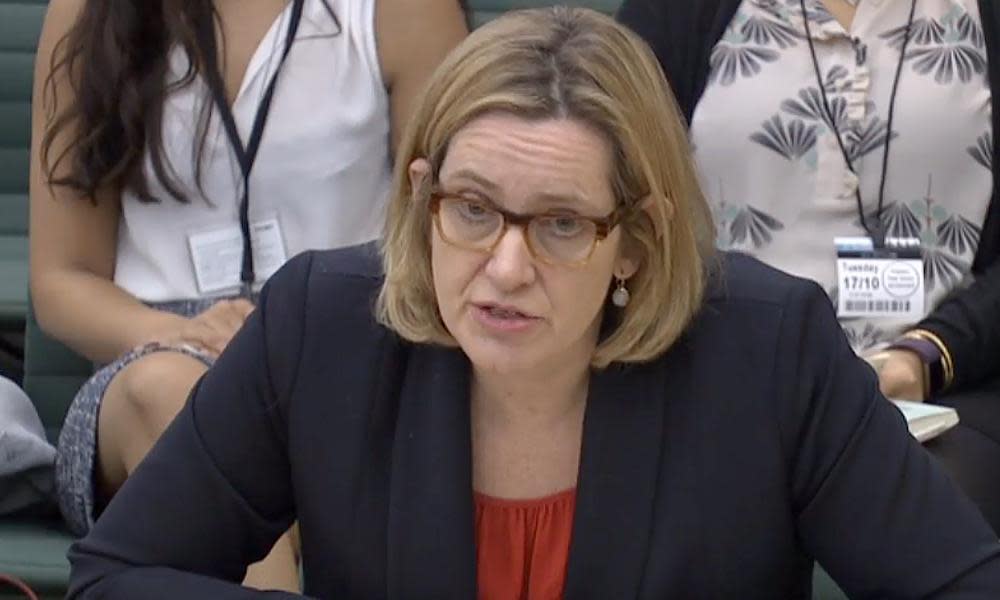UK to begin registering EU nationals for 'settled status' by end of 2018

The registration of 3 million EU nationals in Britain will begin by the end of next year with the “default position” of the Home Office to accept applications, the home secretary has told MPs.
Amber Rudd said 1,200 extra staff were to be recruited by next April to provide an “easy access” registration process she promised would be “completely different” from the troubled permanent residency application system that has undermined confidence in the Home Office.
She told MPs on Tuesday that the Treasury had so far made £50m available to fund the preparation costs this financial year for the new registration system. The Home Office has yet to agree with the Treasury how much extra will be needed from this March 2018 to get the system under way.
MPs also heard troops could be deployed to police the borders in the event of a “no-deal Brexit” but doing so would be the ultimate option.
“I am unable to rule anything out. Any use of military would be an absolute last resort,” said the Home Office’s permanent secretary, Philip Rutman, after being repeatedly pressed by a member of the Commons home affairs committee.
Rutman also said the recruitment of 300 extra Border Force staff was now under way and they could be fully trained and in place by next September. “Our intention is to deal with preparations at the border through the Border Force,” he said.
Rudd tried to reassure MPs in the face of recent scepticism about the capacity of the Home Office to deliver the registration of 3 million EU nationals, saying it would be an “easy access” online process and would not involve 80 pages plus, as is the case with existing permanent residence applications.
The home secretary said the default position would be to accept EU nationals’ applications for “settled status” if they qualified. Online checks with HM Revenue and Customs/Department for Works and Pensions records would be made, with the applicant’s consent, as would identity and criminal background inquiries.
Rudd said EU nationals currently resident in Britain would be “able to regularise their position” by applying for settled status biometric residence permits if they have lived in Britain for more than five years. Those who fail criminal record checks, are unemployed or fail identity checks may be rejected.
The home secretary confirmed the details on the rights to family reunion of EU nationals in the UK have yet to be agreed in the negotiations. These include the introduction of minimum income thresholds to bring in non-EU spouses into Britain.
Rudd denied there had been a high error rate in Home Office decisions on EU nationals’ applications for permanent residence, but said she accepted there had been mistakes in individual cases for which apologies had been made.
“We are going to be testing and rolling it out in stages to make sure we get it right. We will be nimble on our toes … to make sure we recruit where necessary to keep it up,” she told MPs.
Rudd confirmed that a Home Office white paper on immigration is to be published before the end of this year. A leaked draft published by the Guardian said all new EU migrants would be granted temporary residence permits for up to two years after Brexit apart from those who qualify for a highly skilled permit, which would last three to five years.
Activists campaigning for the preservation of rights of EU citizens say they do not want the Home Office involved in the registration process as the department could not be trusted to not make mistakes and ruin people’s lives.
The3million campaign group reiterated its position, outlined in a letter to the European commission in August, that the rights of EU citizens was not an immigration matter and should not be supervised by a government department that erroneously sent about 100 deportation letters to EU nationals this summer.
“It’s very worrying that the home secretary is denying that the Home Office had a high error rate when processing EU citizens’ application for permanent residence because lessons must be learned and apologies must be made to start rebuilding trust,” said Nicolas Hatton, the campaign’s co-founder.
“At the moment, the3million has no confidence in the Home Office registering 3 million people and this is one of the key issues with the proposed settled status the British government is trying to agree in the Brexit negotiations with the EU.”
The European commission and the European parliament have sided with EU citizens living in the UK and have insisted that the European court of justice continues after Brexit to have oversight of the rights of those settled in the UK before the country leaves the bloc.
Elmar Brok, a German MEP from Angela Merkel’s CDU party, told BBC2’s Newsnight programme that the UK had to agree to the principle of citizens’ rights that was sustainable and that it was “not just a question of British law and British courts” having oversight of their post-Brexit rights.
The UK is hoping its offer to write the final deal on rights for EU citizens into law will satisfy concerns across Europe.

 Yahoo News
Yahoo News 
